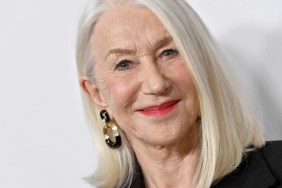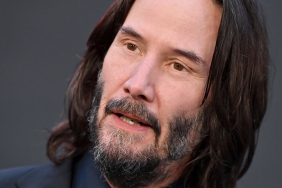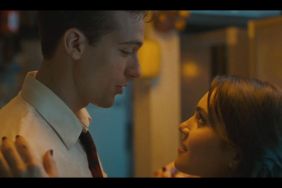Ben Lewin’s The Sessions has been playing in theaters for a few weeks, having first gotten attention at this year’s Sundance Film Festival, and much of the discussion to date has been about the performances by John Hawkes and Helen Hunt. Hawkes plays Bay Area poet Mark O’Brien who suffered from debilitating childhood polio that kept him in an iron lung and paralyzed him from the neck down, while Hunt plays a sex surrogate who helped him overcome his lack of sexuality due to those limitations at the age of 39.
You have to give some of the credit to Australian writer/director Ben Lewin, who found and read Mark O’Brien’s article and realized that it would make a good movie, then went through a five-year process to get that movie made. The first step was to write a screenplay that captured the voice of Mark O’Brien, who had become a respected advocate for the disabled as well as an esteemed poet and author, and then finding a cast who could pull off the difficult and graphic sex scenes expected of them.
What’s surprising is that it’s such a strong movie from a filmmaker we honestly had never heard of, but that’s because he hadn’t made a feature film since 1994 and none of his three films had gotten much attention, leading him to direct television.
ComingSoon.net spoke with Lewin a few weeks back about the movie. (Note: A few times during the interview we reference Jessica Yu’s award-winning short documentary “Breathing Lessons” about O’Brien, which you can watch for free at SnagFilms.com.)
ComingSoon.net: I just watched the documentary “Breathing Lessons” that Jessica Yu made. Was that your way into Mark O’Brien’s life?
Ben Lewin: No, no, it was the article. I really didn’t know anything about the Mark O’Brien story. I just stumbled across the article, totally by accident, on the internet and then in the course of researching Mark O’Brien, I discovered the documentary. I remember having watched the Oscars that year but what stuck in my mind was Jessica’s acceptance speech, which was one of the most entertaining that I ever heard where basically what she said was that the dress she was wearing cost more than the movie. That stuck in my mind, but her documentary was an incredible tool for us, I mean particularly for John Hawkes.
CS: How did you go about getting the rights to the article and then did you have access to Cheryl, the sex surrogate, or anyone else who knew Mark that you could use?
Lewin: In tracking down the rights to the article, I discovered that Mark’s literary rights were owned by the woman who was his girlfriend before he died and I did not realize that was the last chapter of his life. Contrary to what he believed, that he would never have a real relationship with somebody, he spent the last few years of his life with Susan Fernbach, who was his companion, lover and literary collaborator. She gave me an option on the story and was also kind of a literary soulmate for me in that she was kind of a window, as much as I had, into who he was, how he spoke, how he thoughts, and always a reference point as I was developing the script. She also helped me connect with Cheryl, the real surrogate, and meeting Cheryl was a major turning point as well, because hearing her side of the story and her whole take on it enabled me to see the whole thing as a relationship movie, which I found much easier to tell then the format of a biopic. It felt that as a relationship movie it had a natural arc, a natural beginning and end, so both Susan and Cheryl had a crucial effect on the development of the script and the outcome.
CS: Did they meet at Mark’s funeral? I’d be surprised that after Cheryl stopped treating Mark that she would be back in touch with anyone. How did they meet?
Lewin: I think they may have even met before the funeral, I’m not sure, but they certainly did meet at the funeral and Cheryl did maintain contact with Mark. She would go to his birthday parties. They were friends later. It was not just a slam-bam-thank-you-ma’am sort of affair.
CS: He talks a little bit about the article in the documentary but it’s very much like “Oh, this happens” and then he moves on. He doesn’t talk about it as very much.
Lewin: The article was published in 1990 and the events happened in the late ’80s-I think that’s more or less the timeline.

CS: When did you get involved?
Lewin: I read the article in late 2006. I know that I connected with Susan in January 2007, which is when I pretty much began the process. It was pretty much five years to the day from meeting Susan to showing the film at Sundance, and that believe it or not, is regarded as a fairly short time. Five years from concept to completion is short.
CS: Was it hard to get financing? That always seems to be part of the difficulty with indie films.
Lewin: Financing is always hard, but I think once we recognized that it was pointless putting the script out to the usual suspects. I mean, I had no star power. It was a difficult subject, and I think had we continued down that line of sending the film to production companies or studios, I would have had one foot in the grave before anyone opened Page 1. What in fact happened was when I met Cheryl, I was with a friend, he was an old law school buddy who was on holiday in San Francisco with his family–an Australian guy–and he was so taken by the story that he stepped up and said, “I’ll help you finance it and put up the first 20% of the budget.” That was highly motivating because I saw him as kind of a sample of the audience. That’s basically how we raised the money, we hit up our friends and family. The old-fashioned way. In fact, we were still raising money when we were shooting and Judi (Levine, the producer) would call people and tell them they were investing rather than ask them.
CS: What about getting John Hawkes? Had you been familiar with his work beforehand?
Lewin: I had not. I really owe it to our fabulous casting director Ronnie Yeskel for bringing him to my attention and really insisting I take him seriously, and she was absolutely right. She was quite passionate about the idea that he was the right guy for the job.
CS: Had he already done “Winter’s Bone” at that time?
Lewin: He had. I even watched “Winter’s Bone” and went “What? That creepy old guy?” But when you meet John you realize by nature he’s much closer to the character that I was depicting. He’s kind of wry and witty and very warm-hearted, and I thought just perfect for the part.
CS: John’s always full of surprises. I spoke to him about “Martha Marcy” last year and he mentioned the movie, but didn’t say much about it and when I saw it at Sundance I thought, “Wow, this is a great movie. Why wouldn’t he be talking it up more?” I guess he’s just modest.
Lewin: Yes, he’s one of the most surprising actors of his generation, isn’t he? People get stuck in the character actor mold, but I think he has all the ingredients of a leading man.
CS: Absolutely. Most people will already know Helen Hunt’s work, so how did you approach her about doing this?
Lewin: I got a call one day saying “Helen Hunt would like to meet you to discuss this project,” and I was very flattered. “Helen Hunt wants to talk about this with me?” We had a very creative and serious meeting and as a result of which I was quite convinced that she was it. She’d read the script. I think once John was in the film, the script began to get a bit of buzz and agents began to read it, even in the big agencies. There was a kind of mini-avalanche of interest in the leading lady. It took me quite by surprise.
CS: Moon Bloodgood is quite surprising in this because we’ve seen her do a lot of action movie and she’s very beautiful but in this, she wears glasses and is more subdued. I’d hate to call her “dowdy” but she definitely isn’t how we’ve seen her.
Lewin: I tried to make her as dowdy as possible. We did dull her down as far as we could. Yeah, she was a surprise. Look, at the last moment, I realized that all the Asian actresses that we auditioned were tiny and it wasn’t going to be plausible that they could push him around and heave him around and so on and so forth, so I started looking Asian actresses who were more athletic and Moon is very athletic. When I met her, I just instantly liked her and trusted my instinct, and I thought she was a terrific surprise because I don’t think she’s previously taken herself seriously enough as an actor. She has wonderful timing and the ability to do very little and do a lot with very little, which is a gift.

CS: She adds a comedic element to the movie and it’s surprising there’s that much humor in the movie. Maybe if I knew Mark’s writing beforehand I would expect it, but it took me by surprise.
Lewin: Susan was always encouraging me to see the funny side of Mark. I felt that I had permission to do that. You never know how faithfully that you reproduce a character, particularly if that person is dead, but I felt liberate to use his humor and somehow incorporate my own.
CS: It’s a great script and I like the way you incorporated his poetry. Watching the doc after seeing your movie twice, it’s really amazing to see how accurate it was to who he was.
Lewin: When I was editing at quite a late stage, I went back and watched “Breathing Lessons” again just to get a sense of how his poetry was used. I started to incorporate even more of the poetry into our movie as a result of that. It’s something that you have to be reasonably delicate about but I felt that his poetry really was his inner voice and that in a way compensated for his motionlessness, his physical limitations, in terms of the dramatic effect, I’m not talking about in real life. In dramatic terms, being able to use his poetry just gave the whole thing a lot more dimension.
CS: Also what I like about the movie is that we see a lot of things we normally wouldn’t see. The fact you had access to Cheryl and you could get some idea what happened. Did she share her notes with you or were those off limits?
Lewin: Absolutely. What you see in the movie is very much what her notes were about, so she did share her notes with me.
CS: The other side of it is Mark talking to William H. Macy as his priest and those are two things that you would think were so private and personal. There were literally only two people present for those events and one of them is no longer around to share what happened.
Lewin: Well, the priest is a construct, although Mark in his article talks about consulting his priest and getting guidance from his priest. I didn’t know who that priest was, and it’s really just my sense of what that character would have been like.
CS: Did you get the sense from Susan that he was still very religious? I don’t get that impression from the documentary as much. It’s not as prevalent.
Lewin: I got that also from his own writing and certainly, that was the impression Cheryl had. Yes, you’re right. It doesn’t feature a lot in the documentary but it certainly does in his writing.
CS: The big chance since Sundance was the title (it played there as “The Surrogate”), so have you changed anything else or done any work since then?
Lewin: No, Fox Searchlight bought exactly what they saw at Sundance, and apart from the change of title, that is exactly what it is at the moment.
CS: How do you feel about the change in title?
Lewin: I feel fine about it. We knew that they might potentially be a legal problem because there was another movie out there called “Surrogates,” which Disney made not that long ago.
CS: Really? That movie?!
Lewin: Yeah, and neither Disney nor Fox wanted the two movies to be confused with each other, and I actually think “The Sessions” is actually a better title in that people tend to assume that “The Surrogate” has something to do with surrogate babies.

CS: That’s what I was thinking, too.
Lewin: And I think “The Sessions” is more suggestive and leaves it more open. It’s always a little bit of a hiccup to have to change the title but in the end, it’s no big deal.
CS: How difficult was it to handle the sex in the movie in terms of how much to show, how graphic to be in the discussions? That’s really what the movie is about, so it seems like it would be hard to get around that.
Lewin: Yeah, you can’t shy away from that, and Helen was certainly aware that this wasn’t a movie where you could be coy. I knew that she was prepared to take it on for what it was and not shirk the obvious. One of the first questions she asked me was who was the director of photography, and how we were going to shoot the sex scenes? And I said the same way as the rest of the movie. There was going to be no special lighting or no special camera angles. It’s just going to be part of the narrative, very mundane and ordinary, and I think she was able to bring a lot of that real banality to it rather than anything titillating. I think that although there’s a certain amount of shock value and it is confronting, but it just isn’t there to be exploitative in any way. I think people accept that the sexuality is what it’s about and that it’s about the mechanics of it in a large sense (chuckles), very straightforward in what bit goes where.
CS: I think what really surprised me was that another movie I liked was “Hope Springs,” which I’m not sure if you’ve seen that yet.
Lewin: I haven’t.
CS: But these are two movies about sex that are very funny and very direct and it’s interesting that two movies that handle sex so directly are really quite strong crowdpleasers.
Lewin: It’s not a particularly American thing, is it?
CS: Not really, no, not at all. So what do you want to do next?
Lewin: I don’t know. I still feel like I’ve gone down this rabbit hole and I’m wondering to see where it comes out. I’m kicking the tires on a bunch of projects, I’ve got a writing assignment that I’m way behind on, but I don’t as yet what I’ll be filming next, but there are some interesting prospects. Nothing big and epic. I like a small, contained story preferably.
CS: What would you like people to get out of this movie when they see it?
Lewin: Someone came out of a screening and said they were never going to take sex for granted again. That’s not such a bad message. I’d just like them to feel like they’ve been on an emotional journey that kind of lingers, that this is not the sort of movie that you immediately go away and think about something else, but I think that just conveying the experience in an authentic way is gratification in itself.
CS: It’s a shame Mark wasn’t around to see it because I think he would have liked it.
Lewin: Yes, I hope so.
The Sessions is now playing in select cities and will continue to expand throughout November. You can also read our interview with John Hawkes here and our review here.









